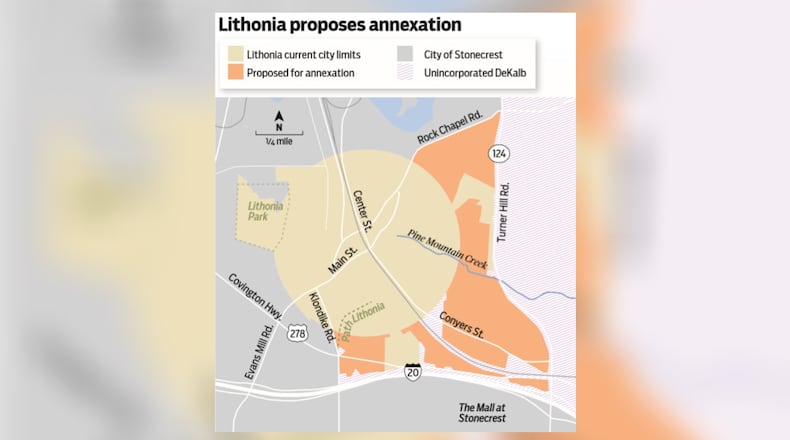One of metro Atlanta’s smallest and oldest cities is nearly out of options to grow in size, population and influence.
Lithonia, founded in 1846, tried to expand years ago through annexation but came up short. Instead, the City of Stonecrest was created and nearly surrounds its tiny neighbor — the key word is nearly.
Voters will decide in November if Lithonia should expand east, add hundreds of new residents and fulfill the first step of a multiphase plan to quadruple the city’s size. The city’s eastern border is unincorporated DeKalb County, the last place Lithonia could absorb.
“We’ve always been a small city, and we’ve always wanted to grow, but we got so stuck in the historic side of it and keeping it historic,” Mayor Shameka Reynolds told The Atlanta Journal-Constitution. “Looking at how times are changing now, it’s been time for growth for the City of Lithonia.”
The city, which spans fewer than 600 acres and 2,800 residents, aims to annex nearby residential streets, undeveloped land and industrial parks, which would nearly increase the city’s physical size by 50%.
The annexation will appear as a local referendum on ballots this November for current Lithonia residents and those who could be annexed.
Reynolds is among the city leaders leading the annexation charge, and she said annexation is the only way for the city to quickly grow and attract new businesses.
“There’s only so much we can do being so small. We’re actually needing people to come into the city to help us grow,” she said. “... Right now, we can’t get Publix, we can’t get AT&T, we can’t get all these types of different things because we’re so small.”
‘Swallowed up by Stonecrest’
In 2015, then-Mayor Deborah Jackson pitched an ambitious plan that would have added up to 8,000 additional residents to Lithonia, quintupling the city’s population. Leaders of the Stonecrest cityhood movement were against that plan, since it would eat into the proposed city limits for Stonecrest.
Stonecrest’s movement was victorious, becoming DeKalb’s second most populous city in 2017 and bordering Lithonia to the north, south and west. The Mall at Stonecrest and Lithonia Industrial Park, both central facets of Lithonia’s annexation plans, now belong to Stonecrest.
“We pretty much got swallowed up by Stonecrest,” Reynolds said.
In 2020, the city conducted an annexation study to review its options. City leaders developed a three-phase annexation plan, starting with 285 parcels close to the current city limits. If adopted, the new city limits will stretch to Turner Hill Road, Rock Chapel Road, Klondike Road and closer to I-20.
Approximately 480 people live in the proposed annexation area, according to a data analysis by The Atlanta Journal-Constitution.
“They already think they’re in the City of Lithonia, because their next-door neighbors are in the City of Lithonia,” Reynolds said. “... the first phase is really just the people that really should be in the city anyway.”
The other two phases would extend the city limits east of Turner Hill Road, absorbing swaths of mostly undeveloped and industrially-zoned land. About 750 people live in these areas. Reynolds said those phases are contingent on residents supporting the first phase.
Credit: City of Lithonia
Credit: City of Lithonia
According to the city, phase one would add nearly 300 acres to the city, which have an appraised value of about $22 million.
Rather than pursuing a resident-led petition, City Administrator LaThaydra Sands said the city decided to move forward with a referendum, which was approved by the state Legislature earlier this year. The ballot referendum would need majority approval from voters to pass.
Joining a city
Lithonia is holding monthly annexation town halls, and the most recent one took place last Wednesday. Patrilla Arrington, who lives along Pine Mountain Road in the proposed annexation area, asked multiple questions about what would happen to county-provided services.
Reynolds said any services the city provides, such as police and road paving, will switch over. The city still relies on the county for many services, such as sanitation and water, so those won’t change. Councilman Ric Dodd added that Lithonia’s small size allows city leaders to better listen to individual residents’ needs and questions. He brought up public works as an example.
“You don’t know where your stormwater fees are going (in DeKalb),” he said. “But if it’s going to the City of Lithonia, it’s going to your own backyard.”
Renee Cail, president of an activism group that’s rallied against industrial facilities near residential neighborhoods in south DeKalb, asked city leaders about what annexation would mean for developers. Councilwoman Diane Howard said city leaders will be able to keep a closer eye on resident concerns than the county.
“The city can control what is built and what is built around you and your property. That is a great benefit,” Howard said. Reynolds also told the AJC that the city has not made any deals with developers or corporations for the vast tracts of new city land that hinge on the annexation passing.
According to city calculations, the residents in the proposed annexation area would see their property taxes increase roughly 5.9%, but Sands said that estimate is likely high, since the city recently lowered its property tax rate.
Lithonia’s local elections will remain fairly unaffected by the annexation, since all elected officials hold at-large seats. The only major change would be that 480 new residents would get to run and vote in those races.
“Hopefully it’ll benefit the City of Lithonia and of course better the citizens of Lithonia and make us bigger and better,” Reynolds said.
— AJC data specialist Jennifer Peebles contributed to this article.
About the Author
Keep Reading
The Latest
Featured



